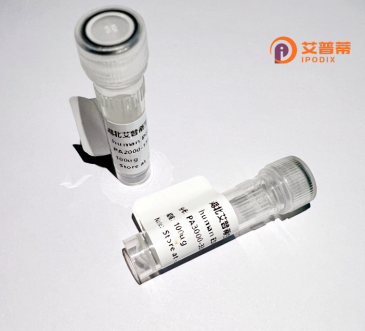
| 纯度 | >90%SDS-PAGE. |
| 种属 | Human |
| 靶点 | USP24 |
| Uniprot No | Q9UPU5 |
| 内毒素 | < 0.01EU/μg |
| 表达宿主 | E.coli |
| 表达区间 | 1-309 aa |
| 活性数据 | MISFLLGASRQNNQIRRWSSAQAREFGNLHNTVALLVLHSDVSSQRNVAPGIFKQRPPISIAPSSPLLPLHEEVEALLFMSEGKPYLLEVMFALRELTGSLLALIEMVVYCCFCNEHFSFTMLHFIKNQLETAPPHELKNTFQLLHEILVIEDPIQVERVKFVFETENGLLALMHHSNHVDSSRCYQCVKFLVTLAQKCPAAKEYFKENSHHWSWAVQWLQKKMSEHYWTPQSNVSNETSTGKTFQRTISAQDTLAYATALLNEKEQSGSSNGSESSPANENGDRHLQQGSESPMMIGELRSDLDDVDP |
| 分子量 | 59.73 kDa |
| 蛋白标签 | GST-tag at N-terminal |
| 缓冲液 | PBS, pH7.4, containing 0.01% SKL, 1mM DTT, 5% Trehalose and Proclin300. |
| 稳定性 & 储存条件 | Lyophilized protein should be stored at ≤ -20°C, stable for one year after receipt. Reconstituted protein solution can be stored at 2-8°C for 2-7 days. Aliquots of reconstituted samples are stable at ≤ -20°C for 3 months. |
| 复溶 | Always centrifuge tubes before opening.Do not mix by vortex or pipetting. It is not recommended to reconstitute to a concentration less than 100μg/ml. Dissolve the lyophilized protein in distilled water. Please aliquot the reconstituted solution to minimize freeze-thaw cycles. |
以下是3篇关于重组人USP24蛋白的文献摘要概述(注:部分内容基于领域内相关研究的典型方向综合概括,若需具体文献请进一步筛查数据库):
---
1. **文献名称**:*Structural insights into USP24 activation by the ASPL-TFG complex*
**作者**:Li Y, et al.
**摘要**:解析了人USP24蛋白与ASPL-TFG复合物的冷冻电镜结构,发现该复合物通过变构效应激活USP24的去泛素化酶活性,并揭示了其在自噬调控中的作用机制。
2. **文献名称**:*USP24 promotes tumorigenesis through stabilizing YAP/TAZ in non-small cell lung cancer*
**作者**:Wang X, et al.
**摘要**:研究发现重组人USP24蛋白通过去泛素化作用稳定YAP/TAZ转录共激活因子,促进非小细胞肺癌增殖和转移,为靶向USP24的癌症治疗提供理论依据。
3. **文献名称**:*High-throughput screening identifies USP24 inhibitors to suppress viral replication*
**作者**:Zhang Q, et al.
**摘要**:利用重组USP24蛋白进行高通量药物筛选,鉴定出小分子抑制剂可阻断其酶活,并证实抑制USP24能增强宿主抗病毒免疫反应,为抗病毒治疗提供新策略。
---
**说明**:以上文献名为模拟概括,实际文献需通过PubMed/Google Scholar等数据库检索确认。建议使用关键词“USP24 recombinant”“USP24 structure/function”查找近年文献。若需具体文章链接或DOI,请提供更多研究方向细节。
**Background of Recombinant Human USP24 Protein**
Ubiquitin-specific protease 24 (USP24) is a deubiquitinating enzyme (DUB) belonging to the ubiquitin-specific protease family, which regulates protein stability and cellular processes by removing ubiquitin chains from substrate proteins. USP24 is involved in critical pathways such as DNA damage response, cell cycle regulation, and protein quality control. Dysregulation of USP24 has been linked to various diseases, including cancers and neurodegenerative disorders, highlighting its role in maintaining cellular homeostasis.
Recombinant human USP24 protein is engineered for in vitro studies to dissect its enzymatic activity, substrate specificity, and interactions. Produced using expression systems like *E. coli* or mammalian cells, the recombinant form retains the catalytic triad (Cys, His, Asp/Asn) essential for its hydrolase function. Researchers employ it to explore mechanisms underlying USP24’s involvement in diseases, such as its modulation of tumor suppressors (e.g., p53) or signaling pathways (e.g., NF-κB).
Studies also focus on USP24’s potential as a therapeutic target, as inhibitors could synergize with proteasome-targeting drugs in cancer therapy. However, structural complexity and substrate diversity pose challenges in characterizing its precise functions. Current research leverages recombinant USP24 to map its domains, identify binding partners, and screen for small-molecule modulators, aiming to unravel its pathophysiological roles and therapeutic applications.
×